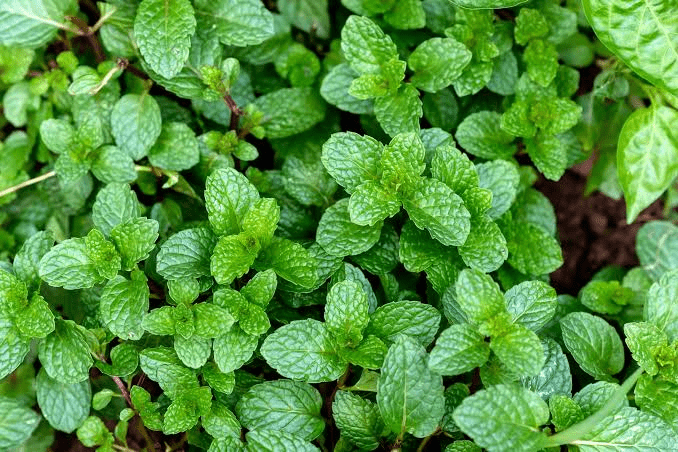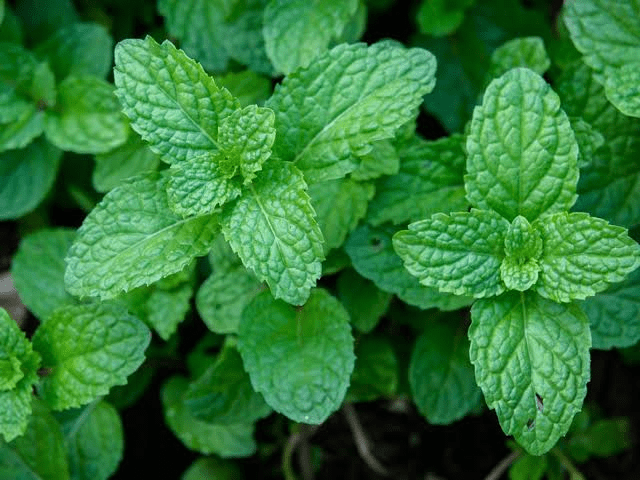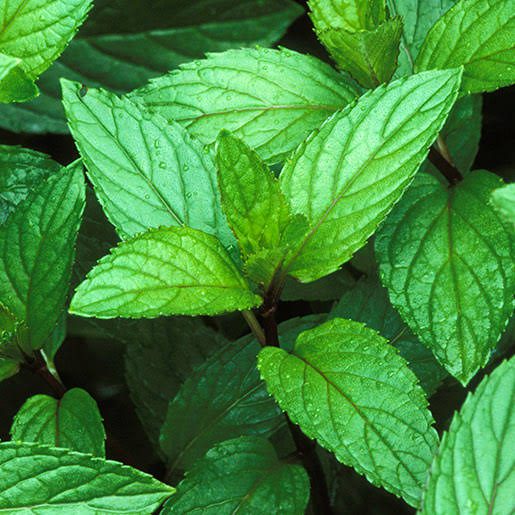Peppermint, a well-loved and widely recognized herb, is renowned for its invigorating scent and versatile uses. This aromatic herb, scientifically known as Mentha × piperita, belongs to the mint family and boasts a rich history dating back centuries. Known for its distinctive, refreshing flavor and aroma, peppermint is a hybrid of watermint and spearmint, creating a plant with numerous culinary, medicinal, and aromatic applications.
Peppermint is characterized by its bright green, serrated leaves and square stems. Its essential oil, extracted from the leaves, contains menthol, the compound responsible for its cooling sensation and minty flavor. This unique blend of compounds makes peppermint a popular choice in herbal teas, culinary dishes, and a wide range of products, from toothpaste to essential oils.
Beyond its culinary and aromatic appeal, peppermint is celebrated for its potential health benefits. It is often used to ease digestive discomfort, alleviate headaches, and provide relief from congestion.
Peppermint essential oil is a staple in aromatherapy for its ability to stimulate the mind and promote relaxation. Whether sipped in a hot cup of tea or enjoyed as a soothing oil, peppermint has become an integral part of many cultures worldwide, recognized for its versatility and refreshing properties.
The Botanical Description of Peppermint
1. Plant Species: Peppermint, scientifically known as Mentha × piperita, is a hybrid plant belonging to the Lamiaceae family. It is a cross between watermint (Mentha aquatica) and spearmint (Mentha spicata), resulting in a unique and versatile herb.
2. Physical Characteristics: Peppermint is characterized by its square stems, a common feature of plants in the mint family. The plant boasts bright green leaves that are serrated along the edges, releasing a strong, refreshing aroma when crushed. Its flowers are pink to purple, arranged in dense spikes at the tips of the stems.
3. Growth Habit: Peppermint is a perennial herbaceous plant, meaning it lives for several years. It thrives in moist, well-drained soil and spreads rapidly through its underground rhizomes, forming extensive colonies.
4. Aromatic Qualities: One of the defining features of peppermint is its potent aroma, primarily due to its high menthol content. Menthol is a compound responsible for the cooling sensation and distinctive minty flavor associated with peppermint. This aromatic quality makes it widely popular in culinary and medicinal applications.
The Geographic Distribution of Peppermint
1. Native Habitat: Peppermint is native to Europe and Asia, where it grows in damp environments, such as stream banks and the edges of marshes. It thrives in regions with temperate climates, moderate sunlight, and consistent moisture.
2. Global Cultivation: Due to its widespread utility, peppermint is cultivated in various parts of the world. It is particularly well-suited for cultivation in temperate regions, including North America and parts of Asia. Its adaptability has made it a common herb in herb gardens and commercial cultivation.
3. Cultivation Practices: Peppermint is often grown commercially for its essential oil, which is widely used in the food, pharmaceutical, and cosmetic industries. Cultivating peppermint requires well-drained soil, adequate irrigation, and regular harvesting to maintain its potency.
4. Economic Importance: Peppermint cultivation contributes significantly to the economies of countries where it is grown. The essential oil extracted from peppermint is a valuable commodity, and the herb is in constant demand in various markets worldwide.
The Chemical Composition of Peppermint
1. Menthol: Menthol is the primary chemical component of peppermint responsible for its cooling sensation. It has analgesic properties, making it useful in pain relief products and topical applications.
2. Menthone: Menthone is another essential oil found in peppermint, contributing to its minty flavor. It is commonly used in the food and beverage industry for its refreshing taste.
3. Menthyl Acetate: This compound adds to the overall aroma of peppermint and is often used in perfumes and scented products.
4. Rosmarinic Acid: Rosmarinic acid is an antioxidant found in peppermint, providing potential health benefits. It is believed to have anti-inflammatory and antimicrobial properties, making it valuable for various medicinal applications.
In summary, Peppermint (Mentha × piperita) is a hybrid herb with a distinct botanical description, thriving in temperate regions around the world. Its chemical composition, characterized by compounds like menthol and menthone, not only gives it its unique flavor and aroma but also contributes to its numerous applications in culinary, medicinal, and aromatic contexts. Cultivated globally, peppermint plays a vital role in various industries and continues to be a beloved herb for diverse purposes.
Read Also: 15 Medicinal Health Benefits of Thermopsis rhombifolia (Golden bean)
The Medicinal Health Benefits Of Peppermint (Mentha × piperita)

1. Digestive Aid: Peppermint has long been cherished for its digestive benefits. It can help relieve indigestion, bloating, and gas by relaxing the muscles of the gastrointestinal tract, promoting smoother digestion.
2. Headache Relief: The menthol in peppermint can alleviate tension headaches. Applying diluted peppermint oil to the temples and massaging it gently may provide relief from headache discomfort.
3. Respiratory Health: Peppermint’s menthol content serves as a natural decongestant, making it effective in easing symptoms of respiratory conditions like colds and sinus congestion. Inhaling peppermint steam or using it in vapor rubs can provide relief.
4. Nausea Reduction: Peppermint can help alleviate nausea and motion sickness. Sipping on peppermint tea or using peppermint-infused products can help reduce feelings of queasiness.
5. Muscle Pain Relief: Peppermint oil, when diluted and applied topically, can provide relief from sore muscles. It has analgesic properties that may help reduce discomfort.
6. Stress and Anxiety Reduction: Peppermint’s aroma is known for its calming effects. Inhaling the scent of peppermint oil or sipping on peppermint tea can help reduce stress and anxiety.
7. Skin Irritation Treatment: Peppermint has antimicrobial and anti-inflammatory properties that can be beneficial for soothing skin irritations. Applying diluted peppermint oil may help with conditions like itching or mild rashes.
8. Appetite Suppression: Peppermint’s aroma may help curb cravings and reduce appetite, potentially aiding in weight management.
9. Oral Health: Peppermint is commonly found in oral care products like toothpaste and mouthwash due to its ability to freshen breath and provide a clean, tingling sensation.
10. Antioxidant Properties: Peppermint contains antioxidants that can help protect cells from damage caused by free radicals. These antioxidants may contribute to overall health.
11. Painful Period Relief: Peppermint tea is sometimes used to relieve menstrual cramps. Its muscle-relaxing properties can ease the discomfort associated with menstruation.
12. IBS Symptom Alleviation: Peppermint oil capsules are known to help manage symptoms of irritable bowel syndrome (IBS), including abdominal pain and bloating.
13. Allergy Symptom Relief: Peppermint’s anti-inflammatory properties can provide relief from allergy symptoms such as nasal congestion and itchy eyes.
14. Mental Clarity: Inhaling peppermint oil’s aroma can enhance mental clarity and focus, making it useful for studying and concentration.
15. Antimicrobial Effects: Peppermint’s antimicrobial properties make it valuable for addressing minor infections and skin conditions.
16. Wound Healing: Peppermint oil may support wound healing by reducing the risk of infection and promoting a clean environment for the healing process.
17. Potential Cancer Protection: Some studies suggest that compounds in peppermint may have cancer-fighting properties, although more research is needed in this area.
The Methods of Usage to Achieve the Provided Health Benefits Of Peppermint (Mentha × piperita)
1. Peppermint Tea: Sipping on peppermint tea is a common and soothing way to achieve digestive and respiratory benefits. It can also aid in reducing stress and anxiety.
2. Inhalation: Inhaling the aroma of peppermint oil or using a diffuser can promote mental clarity, alleviate respiratory symptoms, and reduce stress.
3. Topical Application: Diluted peppermint oil can be applied topically to relieve headaches, muscle pain, skin irritations, and menstrual cramps.
4. Culinary Use: Adding fresh or dried peppermint leaves to dishes and beverages provides a mild, minty flavor and can contribute to appetite suppression.
5. Supplements: Peppermint supplements, such as capsules or essential oil extracts, are available for specific health benefits like IBS symptom management.
6. Mouthwash and Toothpaste: Peppermint-based oral care products freshen breath and promote oral health.
7. Vapor Rubs: Peppermint-infused vapor rubs are used to alleviate respiratory symptoms and promote better sleep.
8. Skin Creams: Topical creams with peppermint can be applied to soothe skin irritations and promote wound healing.
The Side Effects Of Using Peppermint Medicinal Plant
1. Heartburn: In some cases, peppermint may relax the lower esophageal sphincter, potentially leading to heartburn or acid reflux symptoms.
2. Skin Irritation: Applying undiluted peppermint oil to the skin can cause irritation, so it should always be diluted before use.
3. Allergic Reactions: Individuals with sensitivities to menthol or other compounds in peppermint may experience allergic reactions. Performing a patch test is advisable.
4. Interaction with Medications: Peppermint may interact with certain medications, so individuals taking medications should consult with a healthcare professional before using peppermint products.
5. Gastrointestinal Issues: Excessive consumption of peppermint tea or supplements can lead to gastrointestinal discomfort, including nausea or diarrhea.
6. Avoid in Infants: Peppermint oil should not be used on or near infants, as it may cause breathing difficulties.
7. Lowered Blood Pressure: Excessive consumption of peppermint may lead to lowered blood pressure, which can be a concern for individuals with low blood pressure.
8. Potential Drug Interactions: Peppermint may interact with certain medications, especially those affecting the liver or gallbladder, so consultation with a healthcare professional is crucial.
Peppermint is a versatile herb with a multitude of medicinal health benefits, from aiding digestion to providing relief from headaches and respiratory symptoms. It offers various methods of usage, including teas, topical applications, and supplements, to achieve these benefits.
However, it’s important to be aware of potential side effects and take precautions when using peppermint products to ensure a safe and effective experience. Always consult a healthcare professional when in doubt or if you have specific health concerns.
Read Also: Factors Affecting Successful Pasture Establishment
The Scientific Research and Studies of Peppermint

1. Digestive Health: Numerous scientific studies have explored the positive effects of peppermint on digestive health. Research suggests that peppermint can help alleviate symptoms of indigestion, bloating, and irritable bowel syndrome (IBS). Its muscle-relaxing properties are particularly beneficial in this regard.
2. Headache Relief: Scientific investigations have delved into the use of peppermint for headache relief. Studies indicate that applying diluted peppermint oil to the temples can help reduce tension headaches, providing a natural alternative to over-the-counter pain relievers.
3. Respiratory Benefits: The menthol content in peppermint has been the focus of studies on its respiratory benefits. Research suggests that inhaling peppermint oil or using it in vapor rubs can provide relief from symptoms of colds, sinus congestion, and respiratory discomfort.
4. Nausea and Motion Sickness: Scientific research has examined peppermint’s effectiveness in reducing nausea and motion sickness. Studies indicate that peppermint, in various forms, can help alleviate feelings of queasiness during travel or as a result of morning sickness.
5. Stress and Anxiety Reduction: Studies on aromatherapy have shown that inhaling peppermint oil can lead to reduced stress and anxiety levels. Peppermint’s aroma is believed to have a calming effect on the mind.
6. Skin Irritations: Research into the antimicrobial and anti-inflammatory properties of peppermint has investigated its use in addressing skin irritations. Studies suggest that applying diluted peppermint oil can soothe itching and minor rashes.
7. Appetite Suppression: Scientific research has explored how peppermint’s aroma may affect appetite. Studies indicate that inhaling peppermint can reduce cravings and help with weight management.
8. Antioxidant Properties: Peppermint’s antioxidant content has been the subject of research, with findings suggesting its potential in protecting cells from oxidative stress and reducing the risk of chronic diseases.
9. Oral Health: Scientific studies have examined peppermint’s role in oral health. Research highlights its use in oral care products to freshen breath and promote good oral hygiene.
10. Painful Period Relief: Some studies have investigated the use of peppermint tea for relieving menstrual cramps. The muscle-relaxing properties of peppermint can help ease menstrual discomfort.
11. Allergy Symptom Relief: Scientific research suggests that peppermint’s anti-inflammatory properties may provide relief from allergy symptoms like nasal congestion and itchy eyes.
12. Mental Clarity: Studies have explored the cognitive benefits of peppermint aromatherapy. Inhaling its aroma is believed to enhance mental clarity and focus.
13. Antimicrobial Effects: Research has looked into peppermint’s antimicrobial properties, making it valuable for addressing minor infections and skin conditions.
14. Wound Healing: Some studies have investigated the use of peppermint oil in wound healing. Its antimicrobial properties may promote a clean environment for the healing process.
15. Potential Cancer Protection: While preliminary, certain studies have suggested that compounds in peppermint may have cancer-fighting properties. More research is needed in this area to confirm its effectiveness.
The Safety Precautions and Recommendations In Using Peppermint Medicinal Plant
1. Allergy Testing: Before using peppermint products, especially peppermint oil, perform an allergy test by applying a small amount to a small area of your skin to check for adverse reactions.
2. Dilution: When using peppermint essential oil topically, always dilute it with a carrier oil to prevent skin irritation.
3. Avoid Infants: Peppermint oil should not be used on or near infants, as it may cause breathing difficulties.
4. Consultation: If you are pregnant, nursing, taking medications, or have underlying medical conditions, consult a healthcare professional before using peppermint products to ensure safety.
5. Moderation: Use peppermint products in moderation, especially if you are drinking peppermint tea or using supplements. Excessive consumption can lead to gastrointestinal discomfort.
6. Interaction with Medications: Peppermint may interact with certain medications, especially those affecting the liver or gallbladder. Consult a healthcare professional if you have concerns about potential interactions.
7. Avoid Excessive Heat: Store peppermint oil and products containing peppermint in a cool, dark place, away from excessive heat, to maintain their effectiveness.
FAQs About Peppermint Medicinal Plant
1. Can peppermint help with digestive issues?
Yes, peppermint is known to alleviate symptoms of indigestion, bloating, and irritable bowel syndrome (IBS) due to its muscle-relaxing properties.
2. How is peppermint beneficial for headache relief?
Peppermint can provide relief from tension headaches when diluted peppermint oil is applied to the temples. It has analgesic properties.
3. Is peppermint effective for respiratory health?
Yes, peppermint’s menthol content makes it effective in alleviating symptoms of colds, sinus congestion, and respiratory discomfort. Inhaling peppermint oil or using it in vapor rubs can provide relief.
4. Can peppermint help with nausea and motion sickness?
Yes, peppermint, in various forms, can help reduce feelings of nausea and motion sickness, making it a natural remedy for travel-related queasiness.
5. How does peppermint reduce stress and anxiety?
Inhaling the aroma of peppermint oil can lead to reduced stress and anxiety levels. Its scent has a calming effect on the mind.
6. Is peppermint oil safe for skin irritations?
Peppermint oil can be safe for addressing skin irritations, but it should always be diluted before application.
7. Can peppermint help suppress appetite?
Peppermint’s aroma can reduce cravings and help with appetite suppression, potentially aiding in weight management.
8. Is peppermint safe for oral health?
Peppermint is commonly found in oral care products and is effective in freshening breath and promoting oral health.
9. What are the benefits of peppermint for women’s health?
Peppermint tea may help relieve menstrual cramps due to its muscle-relaxing properties, making it beneficial for women’s health.
10. Does peppermint have antioxidant properties?
Yes, peppermint contains antioxidants that protect cells from oxidative stress and reduce the risk of chronic diseases.
11. How can peppermint provide relief from allergy symptoms?
Peppermint’s anti-inflammatory properties may offer relief from allergy symptoms like nasal congestion and itchy eyes.
12. Can inhaling peppermint aroma enhance cognitive function?
Inhaling peppermint aroma is believed to enhance mental clarity and focus, making it useful for studying and concentration.
13. Is peppermint effective against infections?
Peppermint’s antimicrobial properties can be valuable for addressing minor infections and skin conditions.
14. How does peppermint contribute to wound healing?
Peppermint oil may promote wound healing by providing a clean environment for the healing process and reducing the risk of infection.
Do you have any questions, suggestions, or contributions? If so, please feel free to use the comment box below to share your thoughts. We also encourage you to kindly share this information with others who might benefit from it. Since we can’t reach everyone at once, we truly appreciate your help in spreading the word. Thank you very much for your support and for sharing!
Disclaimer: This article is for educational and informational purposes only. The health benefits described are based on scientific research and traditional knowledge. They ayre not a substitute for professional medical advice, diagnosis, or treatment. Always consult a healthcare professional before using any herb or natural remedy for medical purposes.
Read Also: Succulent Plants: A Guide to Growing and Caring for These Unique Plants

